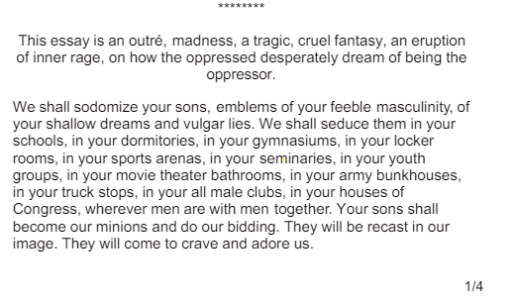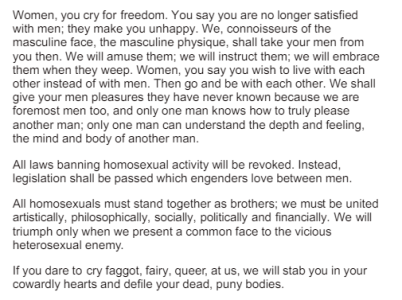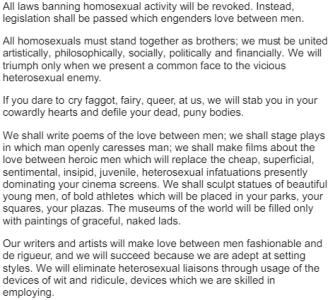Queering nuclear weapons: How LGBTQ+ inclusion strengthens security and reshapes disarmament
Queering nuclear weapons: How LGBTQ+ inclusion strengthens security and reshapes disarmament
By Louis Reitmann, Sneha Nair | June 15, 2023
“They should not allow mentally ill people near weapons of mass destruction.” That was one of dozens of derogatory tweets that the Vienna Center for Disarmament and Non-Proliferation received in response to a December 2022 panel discussion on LGBTQ+ identity in the nuclear weapons space. Most of these tweets were purely hateful, written by trolls. But some respondents explained their opposition, saying that talk about queerness was inserting a non-issue and “derailing” discussions of nuclear weapons. All showed a keen determination to misunderstand the purpose of the event.
While the event received an outpouring of vocal and wide-reaching support from some of the best-known figures in the nuclear field, the disparaging tweets illustrated the common belief that queer identity has no relevance for nuclear policy, and that examining the relationship between queerness and nuclear policy is intended to push a social agenda rather than to address substantive issues.
During this Pride Month, we would like Bulletin readers to understand that the visible representation and meaningful participation of queer people matters for nuclear policy outcomes. Discrimination against queer people can undermine nuclear security and increase nuclear risk. And queer theory can help change how nuclear practitioners, experts, and the public think about nuclear weapons.
It’s about people. Equity and inclusion for queer people is not just a box-ticking exercise in ethics and social justice; it is also essential for creating effective nuclear policy. Studies in psychology and behavioral science show that diverse teams examine assumptions and evidence more carefully, make fewer errors, discuss issues more constructively, and better exchange new ideas and knowledge.
When the stakes of making best-informed decisions are as high as they are with nuclear weapons, governments cannot afford to lose out on the human capital and innovation potential of queer people. Informed by their life experiences, queer people have specific skills to offer that are valuable in a policy and diplomacy context. LGBTQ+ people often must navigate being different from those around them; develop the ability to listen and empathize; and mobilize the skill and perseverance to make themselves heard.
Diversity and inclusion are especially important for the policy community dealing with arsenal development and nuclear posture. Women familiar with this “nuclear priesthood” describe it as “male-dominated and unwelcoming.” Homogenous groups like this are prone to groupthink and hostile to critical examination of baseline assumptions about how adversaries construct and identify nuclear threats and risks. For nuclear weapons policy, this has meant the perpetuation of theories like deterrence and crisis stability, which have contributed to increasing nuclear arsenals and a growing risk of nuclear use.
Such workplace cultures also create enormous psychological stress for minority staff, including queer people, who spend lots of time and energy adapting to role expectations, rather than focusing on bringing their full, authentic potential to the policy-making process. This truth is reflected in the personal experiences of queer officials working on nuclear weapons issues. Richard Johnson, US Deputy Assistant Secretary of Defense for Nuclear and Countering Weapons of Mass Destruction Policy, recounts feeling inhibited to speak up and contribute in a workplace culture dominated by traditional masculinity that treated homosexuality as a risk factor.
Exclusion creates nuclear security risks. Exclusion and unfair treatment of queer individuals and other minorities by a homogenous, cis-heteronormative community of practitioners also creates vulnerabilities in nuclear decision making. Cis-heteronormativity is the automatic assumption that someone is heterosexual and identifies with the sex assigned to them at birth. It creates the idea that being heterosexual and cisgender is normal and natural, whereas being queer or trans is a deviation.
Being LGBTQ+ has historically been considered a security risk. Akin to the “Red Scare” anti-communism movement, the “Lavender Scare” was a campaign persecuting and dismissing gay and lesbian federal employees. The linking of homophobia and national security concerns seems to stem from sensationalized case studies of defections of US intelligence specialists to the Soviet Union during the Cold War. This legacy of queerness being considered a security risk is still pervasive in the nuclear field.
Even where laws protecting individuals from discrimination on the basis of sexual identity exist, security practitioners can decide whether a queer person is suitable for a job, on the basis of whether or not an individual is fully “out” and the risks hiring managers believe this poses for the national or nuclear security enterprise. An often-cited reason for excluding queer people is that they could be blackmailed into becoming insider threats, if the risk of having their sexuality outed is leveraged against them. However, such concerns are based on outdated cultural attitudes toward the LGBTQ+ community, rather than evidence that queer people pose a security risk.
Despite setbacks, public acceptance of the queer community is rising globally, and the supposed links between espionage and homosexuality have been unfounded. However, nuclear facilities still have a reputation for being unwelcoming toward queer people and have failed to investigate allegations of homophobia and harassment. In part, this is due to the lack of diversity in the nuclear field. Homogenous organizations run a higher risk of isolating queer employees, leaving them vulnerable to pressure. Employees in the majority can feel threatened by those they perceive as “different” and exclude them due to discomfort, rather than any legitimate risk factors. Nuclear security practice needs to refrain from treating an individual’s behavior or identity as a risk and focus instead on identifying misbehaviors that indicate malicious intent.
By failing to create a welcoming workplace at nuclear facilities—whether military or civilian—practitioners risk reducing the effectiveness of an organization’s nuclear security culture. A report examining sexual harassment in the US National Nuclear Security Administration found that such harassment “can produce harmful psychological, physical, occupational, and economic effects on harassed employees. It can also affect the environment in which they work and lead to decreased organizational performance and productivity and increased employee turnover. In national security settings, sexual harassment can undermine an organization’s core values, cohesion, and readiness, as well as public goodwill.” These risks of sexual harassment are also relevant in the context of homophobia and LGBTQ+ exclusion from the nuclear field, and they demonstrate the security vulnerabilities that nuclear facilities face when failing to address discrimination against queer people.
Including a wider range of perspectives in nuclear decision making creates a more comprehensive definition of who or what constitutes a “threat” to nuclear security. An example of this is the threat posed by some white supremacist groups with plans to acquire nuclear weapons or material, which can go undetected when a white-majority workforce does not perceive these groups and their ideological motivation as a relevant threat to their nuclear security mission. Individuals targeted by these kinds of groups—including women, people of color, and the LGBTQ+ community—are more likely to identify these types of behaviors and attitudes as security risks and can play a crucial role in identifying a potential insider threat.
Queer theory: changing the narrative. Queer identity is also relevant for the nuclear field because it informs theories that aim to change how officials, experts, and the public think about nuclear weapons. Queer theory is a field of study, closely related to feminist theory, that examines sex- and gender-based norms. It shines a light on the harm done by nuclear weapons through uranium mining, nuclear tests, and the tax money spent on nuclear weapons ($60 billion annually in the United States) instead of on education, infrastructure, and welfare. The queer lens prioritizes the rights and well-being of people over the abstract idea of national security, and it challenges the mainstream understanding of nuclear weapons—questioning whether they truly deter nuclear war, stabilize geopolitics, and reduce the likelihood of conventional war. Queer theory asks: Who created these ideas? How are they being upheld? Whose interests do they serve? And whose experiences are being excluded?
Queer theory also identifies how the nuclear weapons discourse is gendered: Nuclear deterrence is associated with “rationality” and “security,” while disarmament and justice for nuclear weapon victims are coded as “emotion” and a lack of understanding of the “real” mechanics of security. The Greenham Common Women’s Peace Camp, a 19-year protest against the storage of US nuclear missiles in the United Kingdom, called attention to the gendered nature of nuclear weapons. The camp’s inhabitants—many lesbian—recognized that the same male-dominated power structures underpinned the oppression of women and nuclear armament. Their protests, often involving feminine-coded symbols like pictures of children, defined nuclear weapons by the existential threat they pose, instead of the protection they supposedly offer. From the queer perspective, the allegation of “derailing” substantive discussions through a non-traditional perspective on nuclear weapons is itself an attempt to exclude marginalized voices and reinforce the idea that nuclear weapons are a domain only for “serious” and “rational” (i.e. male) actors.
Queer theory is also about rejecting binary choices and zero-sum thinking, such as the tenet that nuclear deterrence creates security and disarmament creates vulnerability. It identifies the assumptions and interests these ideas are built on—and imagines alternatives that serve a broader range of interests, including those of the invisible and resource-stripped.
Indeed, queer theory helps us not only see the bad of a world with nuclear weapons, but also imagine the good of a world without them. It envisions using the resources freed up by nuclear disarmament to build structures that tangibly increase people’s safety and well-being through healthcare, social housing, etc. In this scenario, the more than $100 billion that nuclear-armed states spend on nuclear weapons every year could be used to address the climate crisis, which could kill up to 83 million people by 2100.
Queer theory is rooted in the lived experiences of queer people. Because of the rejection they face in cis-heteronormative society, many find validation and purpose outside traditional models for community, career, and family. And yet, they continue to feel society’s pressure to adapt, hide, and edit themselves. This strengthens queer people’s facility to question dominant ideas of what is right, important, or common-sense, and to ask who decides that.
It also creates a sensitivity to the struggles of other marginalized groups. Tully Starr, an Australian activist, explains: “Being queer, coming out, and experiencing discrimination has been a catalyst for questioning the status quo… [Queer people] gravitate towards like-minded individuals, and each person/community presents an opportunity to expand our ideas of what is possible.”
Finally, queer theory informs the struggle for nuclear justice and disarmament. For example, queer artist and writer Jessie Boylan highlights the harm done by nuclear weapons by documenting the social and environmental consequences of nuclear testing in Australia as part of the Atomic Photographers Guild. Queer theory helps to shift the perception of nuclear weapons as instruments for security by telling the hidden stories of displacement, illness, and trauma caused by their production and testing.
The time to do better is now. As the nuclear field continues to reflect on its legacy of exclusion and homogeneity during this Pride Month, we as stakeholders, decision makers, and advocates for change should also realize our privilege of being able to openly discuss the challenges facing the LGBTQ+ community without fear of criminalization, retribution, or death. Participating as oneself in the nuclear field is a right that should be extended to all.
However, including the LGBTQ+ community in the nuclear field is far more than a social issue campaign. It is up to allies, people in power, and the institutions they serve to vocalize their support for LGBTQ+ inclusion, not just because it is the right thing to do, but also because queer people add value to nuclear weapons policy and discourse. Decision makers should look to LGBTQ+ inclusion for better nuclear policy outcomes, and build environments in which queer people can bring their specific skills and lived experiences to bear without fear. Arguments to the contrary are as stagnant and outdated as those who voice them.




